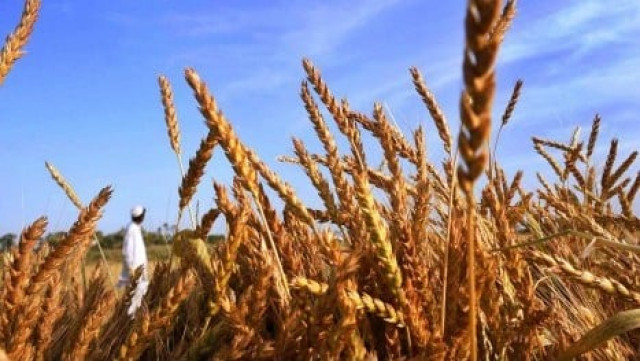Punjab hit by another wheat crisis
Minister claims subsidised commodity being smuggled

Scarcity of flour continues to hit markets across Punjab as the millers accused the government of not issuing wheat as per local requirements and demanded immediate import of the commodity to ensure availability of flour.
Shortage of wheat flour and price distortion have created further chaos as flour ground from the subsidised wheat issued by the Punjab Food Department is selling at Rs860 for a 20-kilogramme (kg) sack and flour ground from private stocks is being sold for around Rs1,000 for a 15kg bag.
Former chairman of Pakistan Flour Mills Association (PFMA) Khaleeq Arshad told The Express Tribune that wheat price was above Rs2,200 a maund in grain markets across Punjab. “The government supplies of wheat are not sufficient to meet the local demand, which has subsequently led to a shortage in different markets of the province,” he pointed out.
Responding to a question, he claimed that the local wheat production was not sufficient to cater to the domestic demand this year.
“During the previous year, the government had carried forward stocks and Punjab was exporting wheat and flour to Afghanistan. This year, all these carried forward stocks have been exhausted and the government did not allow the private sector to procure stocks during procurement drive which further aggravated the situation,” he maintained.
He underlined that though a shipment of 800,000 tonnes of wheat had reached the country, the government should speed up the import of more stocks to meet the local demand.
Another flour miller indicated that there was a wheat shortage of around three million tonnes in the country.
Flour milling industry had warned both federal and Punjab governments some six months back but they did not take timely action. Now when the wheat flour shortage is mounting the government is busy firefighting to avert a crisis. He claimed that the wheat flour crisis would touch its peak in December.
Meanwhile, Punjab Minister for Information Fayyazul Hassan Chohan blamed Sindh government for the current wheat crisis. Addressing a news conference, he said Sindh government was intentionally delaying the release of wheat from official stocks just to provide an opportunity to the opposition to criticise the government. “Some black sheep are also benefiting from this opportunity by smuggling subsidised wheat flour from Punjab to Sindh, which resulted in artificial flour shortage in different areas of the province,” the minister maintained.
PM orders long-term wheat strategy
A shopkeeper, Muhammad Ahmad, highlighted that local administration had launched a crackdown against shopkeepers to rein in the wheat flour crisis. “We have no control over the supply and price of the commodity. Shopkeepers are selling wheat flour on a meagre margin even after making advance payments to flour mills. In most instances, shopkeepers have to wait for a week or so to get stocks from flour mills,” he asserted.
A citizen, Ali Khan, complained that though most shops were selling premium whole wheat flour, the 20kg bag was hardly available in his neighbourhood.
The government should ensure availability of necessities though it has badly failed in controlling their rates, he said and added that citizens are already under stress and financial burden owing to coronavirus lockdown and such attitude of the government would force them to take to the streets.
Meanwhile, Punjab Minister for Industries and Trade Mian Aslam Iqbal directed availability of wheat flour at a fixed price at shops instead of trucking points. He expressed these views while presiding over a meeting of the task force for price control at the Chief Minister’s office on Monday.
The meeting reviewed prices of essential items, Punjab Qeemat App and the performance of price control magistrates.
Published in The Express Tribune, October 6th, 2020.


















COMMENTS
Comments are moderated and generally will be posted if they are on-topic and not abusive.
For more information, please see our Comments FAQ